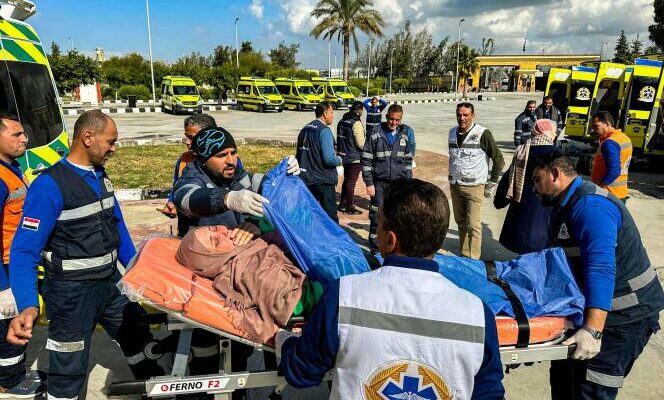In an incessant drone, three Israeli drones patrol the sky. The aircraft are flying over the town of Rafah, on the Palestinian side, almost directly above the border which separates the Gaza Strip from Egypt. Abderrahman Zarb, an 18-year-old Palestinian, stands in front of the large gate overlooked by the Egyptian flag and framed by imposing concrete walls. With his head in the air, he scrutinizes the flight of “zenna”drones, named after the buzzing of bees in Palestinian dialect.
He lives in Egypt, but most of his family is from Gaza. Sunday, February 4, carrying with him carts loaded with sacks of potatoes, trays of eggs and other crates of oranges, he will enter the Palestinian enclave to find his relatives who have taken refuge in the displaced persons camps on the other side. of the border. He doesn’t know when he will come out.
There are a few hundred Gazans, having been in Egypt during the explosion of October 7, 2023, who returned to the Gaza Strip to be closer to their families, at the risk of remaining there. Conversely, only holders of Egyptian or international passports are granted passage after an opaque validation process, or by paying the high price through a network of shady intermediaries.
Identity papers confiscated
While the Israeli army has announced that it is expanding its operations in the south of the enclave where more than 1.5 million civilians are crowded together, all eyes are turning to this border post. The Rafah terminal is the only exit from Gazan hell. But it is barely ajar, firmly controlled by the Egyptian authorities who refuse any exodus of Palestinians towards their territory.
Cairo has nevertheless put in place a protocol to accommodate injured people on its soil. From time to time, an ambulance rushes through the wall. The Egyptian Red Crescent is carrying out drip-by-drop evacuations to different hospitals. With a capacity of two hundred beds, the El-Arich hospital, 55 kilometers to the west along the Mediterranean coast, is on the front line. Since 1er November, four hundred Gazans were treated here. In all, Egypt has received more than 2,200 wounded Palestinians, according to the presidency, plus a few hundred relatives accompanying them.
Once they are out of hell, the nightmare does not dissipate for these Gazans. Admitted to Egypt for medical reasons, they often have their identity papers confiscated and are prevented from traveling in the country unless there is a compelling reason. If some are transferred to hospitals in Cairo, they cannot leave the premises without authorization, and can only speak to journalists under close surveillance by the Egyptian security services keen to appear in solidarity with the Palestinians. Finally, these wounded are asked to return to El-Arich, which has become an obligatory drop-off point, a terminus.
You have 60% of this article left to read. The rest is reserved for subscribers.
